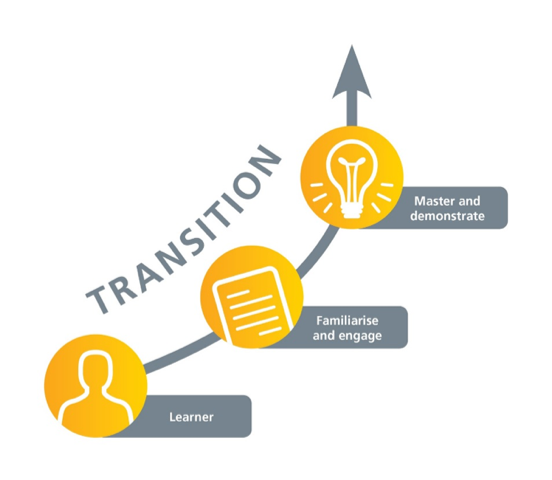To continue to your Student Portal select one of the following options:
Learning Philosophy
As a leader in online education, we know that professional learning is much more than just reading and writing content. When you consider how theoretical concepts apply in your workplace, you will find new ways of problem-solving. This leads to professional growth, an increase in productivity, and innovative contributions to your field.
Our courses are designed for emerging and existing professionals with existing qualifications, significant work experience or both. The objectives, concepts, activities and assessments are aimed at more than simple application of knowledge; this stage of professional learning is about transformation, the application of your professional identity and consideration of how to apply specialist and technical knowledge to contexts and contingencies. In other words, UniSQ UpSkill is about levelling up your professional knowledge and practice.
We know that you are busy, and want to progress your career – while travelling, having time for family and friends, and all the other facets that make life enjoyable. That’s why our courses distil content into rigorous and useful key concepts – and then invite you to apply them to your workplace.
Here are some key frameworks that have informed the development of this learning platform.
Our courses are designed for emerging and existing professionals with existing qualifications, significant work experience or both. The objectives, concepts, activities and assessments are aimed at more than simple application of knowledge; this stage of professional learning is about transformation, the application of your professional identity and consideration of how to apply specialist and technical knowledge to contexts and contingencies. In other words, UniSQ UpSkill is about levelling up your professional knowledge and practice.
We know that you are busy, and want to progress your career – while travelling, having time for family and friends, and all the other facets that make life enjoyable. That’s why our courses distil content into rigorous and useful key concepts – and then invite you to apply them to your workplace.
Here are some key frameworks that have informed the development of this learning platform.
Work-Integrated Learning
This is one of the key ideas embedded in the design of UniSQ UpSkill.
Eichinger and Lombardo (1996) developed the 70:20:10 model of learning in the mid-1990s, proposing that in effective professional learning, only 10% of learning comes about through formal learning and reading, 20% is from mentoring, coaching or colleagues and 70% is from application of tasks and participating in the workplace.
This is why UniSQ UpSkill’s courses support modern learners to develop flexible and relevant skills that are transferable between contexts and settings. Our learning experience embeds activities and assessments that are relevant to the workplace, and provides multiple opportunities to transform and evaluate concepts in your practice.
This is one of the key ideas embedded in the design of UniSQ UpSkill.
Eichinger and Lombardo (1996) developed the 70:20:10 model of learning in the mid-1990s, proposing that in effective professional learning, only 10% of learning comes about through formal learning and reading, 20% is from mentoring, coaching or colleagues and 70% is from application of tasks and participating in the workplace.
This is why UniSQ UpSkill’s courses support modern learners to develop flexible and relevant skills that are transferable between contexts and settings. Our learning experience embeds activities and assessments that are relevant to the workplace, and provides multiple opportunities to transform and evaluate concepts in your practice.
Experiential
David Kolb’s Experiential Learning Theory (2012) suggests that learning is an active process where we do something with new knowledge and understanding – thinking, doing, and feeling. Our learning community is all about discussing modern challenges, workplace dilemmas, disruptions and best practice. You will walk alongside your colleagues and academic experts who will add value with their depth and breadth of theoretical knowledge, and build upon the knowledge and skills you have already developed
David Kolb’s Experiential Learning Theory (2012) suggests that learning is an active process where we do something with new knowledge and understanding – thinking, doing, and feeling. Our learning community is all about discussing modern challenges, workplace dilemmas, disruptions and best practice. You will walk alongside your colleagues and academic experts who will add value with their depth and breadth of theoretical knowledge, and build upon the knowledge and skills you have already developed
Critical Literacies Framework
We have framed our educational design on the Framework for Student Transition and Retention, which re-conceptualises the application of Critical Discourse Theory and constructivism in the deficit-discourse shift (Lawrence, 2005).
We have framed our educational design on the Framework for Student Transition and Retention, which re-conceptualises the application of Critical Discourse Theory and constructivism in the deficit-discourse shift (Lawrence, 2005).

Kolb, A. Y., & Kolb, D. A. (2012). Experiential learning theory. In N. M. Seel (Ed.), Encyclopedia of the Sciences of Learning (pp. 1215-1219). Boston, MA: Springer US.
Eichinger, R., & Lombardo, M. (1996). The career architect development planner. Minneapolis, MN: Lominger Limited.
Lawrence, J. (2005). Re-conceptualising attrition and retention: Integrating theoretical, research and student perspectives. Studies in Learning, Evaluation, Innovation and Development, 2(3). pp. 16-33.
Eichinger, R., & Lombardo, M. (1996). The career architect development planner. Minneapolis, MN: Lominger Limited.
Lawrence, J. (2005). Re-conceptualising attrition and retention: Integrating theoretical, research and student perspectives. Studies in Learning, Evaluation, Innovation and Development, 2(3). pp. 16-33.
The University of Southern Queensland acknowledges the traditional custodians of the lands and waterways where the University is located. Further, we acknowledge the cultural diversity of Aboriginal and Torres Strait Islander peoples and pay respect to Elders past, present and future.
Copyright © University of Southern Queensland 2024
CRICOS: QLD 00244B, NSW02225M TEQSA: PRV12081
CRICOS: QLD 00244B, NSW02225M TEQSA: PRV12081
